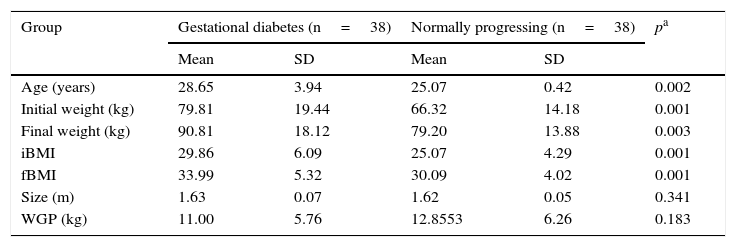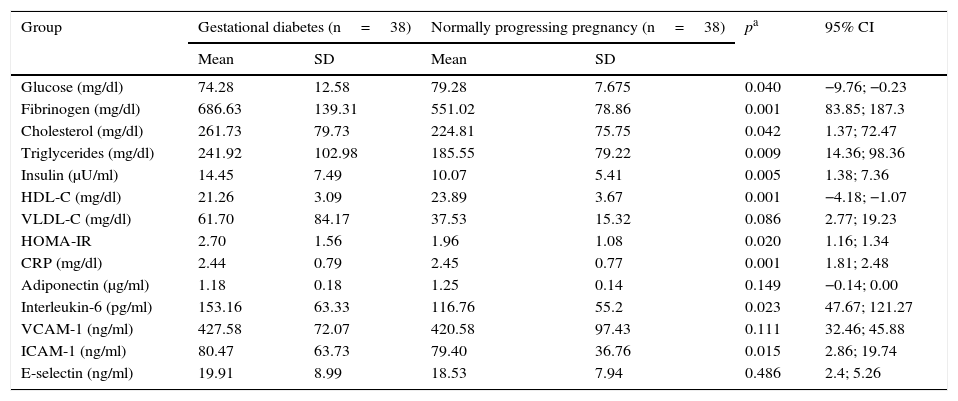The pathophysiology of gestational diabetes itself causes hyperstimulation of adipose tissue and of the placenta cells increasing the production of inflammatory cytokines, which cause changes in the tissues exposed such as the placenta and foetus. Therefore, the objective of this study was to compare metabolic markers and endothelial dysfunction in umbilical cord blood, as well as to determine the presence of atherosclerosis in the placentas of newborn infants of patients with gestational diabetes and in patients with normally progressing pregnancies.
Patients and methodAn analytical cross-sectional study was carried out in 84 patients, obtaining data such as age, smoking and weight gain in pregnancy; the gestational age of the newborns was determined by Capurro, and their weight and destination subsequent to birth, the placentas were also collected in order to look for atherosclerosis through histological studies and glucose, insulin, VLDL-C, HDL-C, triglycerides, cholesterol, fibrinogen, PCR and markers of endothelial dysfunction (adiponectin, VCAM-1, ICAM-1 and IL-6) were determined in blood samples obtained from the umbilical cord.
ResultsPlacental atherosclerosis presented in 28.94% of the group with gestational diabetes compared to 10.52% of the group with normally progressing pregnancies (p=.044); differences were found in glucose, cholesterol, triglycerides, fibrinogen, HOMA-IR, PCR-us, HDL-C, not in VLDL-C. Twenty-one point five percent of the newborns of the gestational diabetes patients required hospitalization, against 5.2% in the control group.
ConclusionsPregnancies that involve diabetes have higher proportion of atherosclerosis, hospitalization of the newborn, insulin resistance, as well as elevation of markers associated with inflammation and endothelial dysfunction in umbilical cord blood.
La fisiopatología de la diabetes gestacional provoca por sí misma una hiperestimulación del tejido adiposo y de las células placentarias que aumenta la producción de citocinas inflamatorias, las cuales provocan cambios en los tejidos expuestos como la placenta y el feto, por lo que en este estudio el objetivo fue comparar los marcadores metabólicos y de disfunción endotelial en sangre de cordón umbilical, así como determinar la presencia de aterosclerosis en las placentas de hijos neonatos de pacientes con diabetes gestacional y en pacientes con embarazo normoevolutivo.
Pacientes y métodoSe realizó un estudio transversal analítico en 84 pacientes, de las cuales se obtuvieron datos como edad, tabaquismo y ganancia de peso en el embarazo; del recién nacido se determinó la edad gestacional por Capurro, el peso y el destino posterior al nacimiento. Además se utilizaron las placentas para la búsqueda de aterosclerosis mediante estudio anatomopatológico y en las muestras sanguíneas obtenidas de cordón umbilical se determinaron glucosa, insulina, colesterol, c-VLDL, c-HDL, triglicéridos, fibrinógeno, PCR y los marcadores de disfunción endotelial (adiponectina, VCAM-1, ICAM-1 e IL-6).
ResultadosLa aterosclerosis placentaria se presentó en un 28.94% del grupo que cursó con diabetes gestacional frente a un 10.52% del grupo con embarazo normoevolutivo (p=0.044); se encontraron diferencias en glucosa, colesterol, triglicéridos, fibrinógeno, HOMA-IR, PCR-us y c-HDL, no encontrándose en c-VLDL. El 21.05% de los recién nacidos de las pacientes con diabetes gestacional requirieron hospitalización frente al 5.2% del grupo control.
ConclusionesLos embarazos que cursan con diabetes presentan una mayor proporción de aterosclerosis, de hospitalización en el recién nacido, de resistencia a la insulina, así como de elevación de marcadores relacionados con inflamación y disfunción endotelial en sangre de cordón umbilical.










